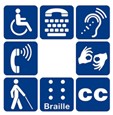Resources
 Accessibility Information & Resources
Accessibility Information & Resources
Click the link below to review the law governing the Commission on Disabilities
COVID-19 Vaccinations: Attention Baltimore City residents and students 16+ with intellectual Disabilities: Please see the BmoreCOVAX Flyer preregister for the Coronavirus vaccine.
Monthly Newsletter
Working with Sign Language Interpreters: Some Helpful Hints
- Before the event, whenever possible, share any notes, outlines, handouts, and uncaptioned movies with the interpreters in advance. Also, share speakers’ names, acronyms, and other specialized terminology that will be used.
- Line of Sight. Position the interpreter(s) near the speaker(s). Provide seating for the deaf or hard of hearing individual(s) with a clear line of sight to the interpreter(s).
- Provide appropriate lighting for the interpreter at all times. If you plan to turn down the lights during the assignment, remember to leave enough lighting on the interpreter.
- Treat the interpreters as professionals. The interpreter is not a personal assistant for the deaf individual, and should only be asked to facilitate communication.
- Look and speak directly to the deaf or hard-of-hearing individual. Look at the person who is deaf or hard of hearing when signing or speaking to them through an interpreter. Do not speak to the interpreter directly. This may feel awkward at first since the message is coming through the interpreter.
- Address the deaf or hard of hearing individual directly:
- Appropriate: “What is your name?”
- Inappropriate: “Ask her what her name is?”
- Sign/speak at the normal tone and pace. The interpreter will tell you if you need to pause or slow down.
- In addition, give the interpreter time to finish so that the deaf or hard of hearing person can ask questions or join the discussion.
- Permit only one person to speak at a time during group discussions. It is difficult for an interpreter to follow several people speaking at once. Ask for a brief pause between speakers to permit the interpreter to finish before the next speaker starts. It can be helpful to ask people to raise their hands and wait to speak after they have been recognized. Also, it is appropriate etiquette for effective communication for each participant to state her or his name before speaking so a deaf-blind individual will know who is talking.
- Relax. If you are unsure of the appropriate way to proceed in a particular situation, just ask.
Information in this guide is based on the following:
- District of Columbia, Office of Disabilities Rights.
- California Department of Social Services. Requesting American Sign Language (ASL) Interpreters (hard copy).
- Disability Support Services, Kansas State University. Tips for Effective Communication with Students using Sign Language Interpreters.
- Mayor’s Office on Disability, City and County of San Francisco, CA. Tips for Using a Sign Language Interpreter:
- Fair Housing Partners of Washington State, Disability Access Resources for Housing Providers
How to Make Your Meeting Accessible
Additional Resources
- Accessibility
- Advocacy
- Children's Services
- Accessible Parking
- Education
- Employment & Job Skill Development
- Equipment
- Housing
- Legal Services
- Library Services
- Medical and Health Care
- Recreation
- Rehabilitation
- Social Service
- Transportation
- Accessibility
- MD Relay, Communication Services
711 (TTY users)
- The Hearing & Speech Agency
(410)310-6780
- Childhood Speech and Language Center
(410)243-3800
- MD Relay, Communication Services
- Advocacy
- Baltimore Neighborhoods, Inc. (Federal Housing)
(410) 243-4400
- Baltimore Neighborhoods, Inc. (Tenants/Landlords)
410-243-6007
- Community Relations Commission
(410) 396-3141
- Parents' Place of Baltimore
(410) 859-5300
- Families Involved Together
(410) 235-5222
- MD Center for Independent Living
(410) 444-1400
- Baltimore Neighborhoods, Inc. (Federal Housing)
- Children's Services
- Developmental Disabilities Administration Central MD Regional Office
(410)234-8200
- MD Infants & Toddlers Program
(410) 767-0261
- School Health
(410) 396-3185
- Developmental Disabilities Administration Central MD Regional Office
- Disabled Parking
- Reserved Residential Parking (Baltimore City)
(410)396-6989
- Tags and Parking Permits-MVA (Maryland)
(800) 950-1682
- Reserved Residential Parking (Baltimore City)
- Education
Baltimore City Public School System (City Schools Connect)
(410) 396-8700 - Employment & Job Skill Development
- Employment & Training Division, Labor Licensing and Regulation
(410) 767-2000
- Office of Employment Development
(410) 396-3009
- Employment & Training Division, Labor Licensing and Regulation
- Equipment
- MD Technology Assistance Program
1-866-881-7488
- National Federation of the Blind
(410) 659-9314
- The Workforce & Technology Center
(410) 554-9385
- Maryland Relay
711
- Maryland Deaf-Blind Equipment Distribution Program
800-825-4595 | TTY: 888-320-2656
- MD Technology Assistance Program
- Housing
Housing & Community Development
(410) 396-5000Housing Authority of Baltimore City
(410)396-3237Rental listings in Baltimore Area
- Legal Services
Maryland Disability Law Center
(410) 727-6352
(back to top) - Library Services
- Enoch Pratt Free Library - Central Library
(410) 396-5430
- State Library For The Blind And Physically Handicapped
(410) 230-2424
- Enoch Pratt Free Library - Central Library
- Medical and Health Care
- Baltimore City Health Department
(410) 396-4398
- Baltimore Mental Health Systems
(410) 837-2647
- Baltimore Substance Abuse Systems INC
(410) 637-1900
- Baltimore City Health Department
- Recreation
- Recreation & Parks
(410) 396-7900
- Therapeutic Recreation
(410) 396-1550
- Recreation & Parks
- Rehabilitation
- League for People with Disabilities
(410) 323-0500
- Division of Rehabilitation Services (DORS)
(410) 554-9442
- League for People with Disabilities
- Social Service
- Department of Social Services
(410) 378-4600
- Resource and Support
(443) 423-4000
- Adult Services
(443) 423-6612
- Homeless Services
(410) 396-3757
- U.S. Social Security Administration
(800) 772-1213
- Child Protective Services
(410) 361-2235
- Department of Social Services
- Transportation
- Mass Transit Administration-Information Line
(410) 539-5000
- Mobility
(410)764-8181
- Mass Transit Administration-Information Line
 Accessibility Information & Resources
Accessibility Information & Resources